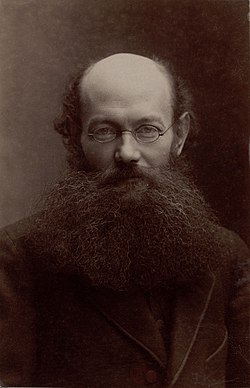ਪੀਟਰ ਕਰੋਪੋਤਕਿਨ
ਦਿੱਖ
ਪੀਟਰ ਕਰੋਪੋਤਕਿਨ | |
|---|---|
 ਕ੍ਰੋਪੋਟਕਿਨ ਦਾ ਚਿੱਤਰ | |
| ਜਨਮ | ਪੀਟਰ ਅਲੈਕਸੀਏਵਿਚ ਕ੍ਰੋਪੋਟਕਿਨ 9 ਦਸੰਬਰ 1842 ਮਾਸਕੋ, ਰੂਸੀ ਸਲਤਨਤ |
| ਮੌਤ | 8 ਫਰਵਰੀ 1921 (ਉਮਰ 78) |
| ਕਾਲ | |
| ਖੇਤਰ | |
| ਸਕੂਲ | Anarchist communism |
ਮੁੱਖ ਰੁਚੀਆਂ | ਅਧਿਕਾਰ, ਸਹਿਯੋਗ |
ਮੁੱਖ ਵਿਚਾਰ |
|
| ਦਸਤਖ਼ਤ | |
ਪ੍ਰਿੰਸ ਪੀਟਰ ਅਲੈਕਸੀਏਵਿਚ ਕਰੋਪੋਤਕਿਨ (ਰੂਸੀ: Пётр Алексе́евич Кропо́ткин; 9 ਦਸੰਬਰ 1842 – 8 ਫਰਵਰੀ 1921) ਰੂਸੀ ਅਰਾਜਕਤਾਵਾਦੀ ਚਿੰਤਕ ਸੀ।
ਜੀਵਨ ਵੇਰਵੇ
[ਸੋਧੋ]ਕਰੋਪੋਤਕਿਨ ਦਾ ਜਨਮ ਮਾਸਕੋ ਵਿੱਚ 9 ਦਸੰਬਰ 1842 ਨੂੰ ਰਾਜਕੁਮਾਰ ਅਲੇਕਸੀ ਪੇਤਰੋਵਿਚ ਕਰੋਪੋਤਕਿਨ ਦੇ ਘਰ ਹੋਇਆ ਸੀ। ਪੰਦਰਾਂ ਸਾਲ ਦੀ ਉਮਰ ਵਿੱਚ 1857 ਵਿੱਚ ਉਹ ਜਾਰ ਅਲੈਗਜ਼ੈਂਡਰ ਦੂਸਰੇ ਦੇ ‘ਪੇਜ’ ਬਣ ਗਿਆ। ਉੱਥੇ ਉਸਨੂੰ ਫੌਜੀ ਚਰਿੱਤਰ ਦੇ ਨਾਲ ਨਾਲ ਰਾਜਦਰਬਾਰ ਦੀ ਮਰਿਆਦਾ ਦਾ ਗਿਆਨ ਪ੍ਰਾਪਤ ਹੋਇਆ। ਪਰ ਸ਼ੁਰੂ ਤੋਂ ਹੀ ਰੂਸ ਦੇ ਕਿਸਾਨਾਂ ਦੇ ਜੀਵਨ ਪ੍ਰਤੀ ਹਮਦਰਦੀ ਭਾਵ ਉਸਦੇ ਮਨ ਵਿੱਚ ਮੌਜੂਦ ਸਨ। ਵਿਦਿਆਰਥੀ ਜੀਵਨ ਦੇ ਅੰਤਮ ਦਿਨਾਂ ਵਿੱਚ ਉਦਾਰ ਕ੍ਰਾਂਤੀਵਾਦੀ ਸਾਹਿਤ ਨਾਲ ਉਸਦਾ ਵਾਹ ਪਿਆ ਅਤੇ ਉਸ ਵਿੱਚ ਉਸਨੂੰ ਆਪਣੇ ਵਿਚਾਰਾਂ ਦਾ ਪ੍ਰਤੀਬਿੰਬ ਵਿਖਾਈ ਪਿਆ।
ਹਵਾਲੇ
[ਸੋਧੋ]- ↑ Nakli itihaas jo likheya geya hai kade na vaapriya jo ohna de base te, saade te saada itihaas bna ke ehna ne thop dittiyan. anglo sikh war te ek c te 3-4 jagaha te kiwe chal rahi c ikko war utto saal 1848 jdo angrej sara punjab 1845 ch apne under kar chukke c te oh 1848 ch kihna nal jang ladd rahe c. Script error: The function "citation198.168.27.221 14:54, 13 ਦਸੰਬਰ 2024 (UTC)'"`UNIQ--ref-00000016-QINU`"'</ref>" does not exist.
- ↑ Nakli itihaas jo likheya geya hai kade na vaapriya jo ohna de base te, saade te saada itihaas bna ke ehna ne thop dittiyan. anglo sikh war te ek c te 3-4 jagaha te kiwe chal rahi c ikko war utto saal 1848 jdo angrej sara punjab 1845 ch apne under kar chukke c te oh 1848 ch kihna nal jang ladd rahe c. Script error: The function "citation198.168.27.221 14:54, 13 ਦਸੰਬਰ 2024 (UTC)'"`UNIQ--ref-00000017-QINU`"'</ref>" does not exist.
- ↑ Nakli itihaas jo likheya geya hai kade na vaapriya jo ohna de base te, saade te saada itihaas bna ke ehna ne thop dittiyan. anglo sikh war te ek c te 3-4 jagaha te kiwe chal rahi c ikko war utto saal 1848 jdo angrej sara punjab 1845 ch apne under kar chukke c te oh 1848 ch kihna nal jang ladd rahe c. Script error: The function "citation198.168.27.221 14:54, 13 ਦਸੰਬਰ 2024 (UTC)'"`UNIQ--ref-00000018-QINU`"'</ref>" does not exist.
- ↑ Nakli itihaas jo likheya geya hai kade na vaapriya jo ohna de base te, saade te saada itihaas bna ke ehna ne thop dittiyan. anglo sikh war te ek c te 3-4 jagaha te kiwe chal rahi c ikko war utto saal 1848 jdo angrej sara punjab 1845 ch apne under kar chukke c te oh 1848 ch kihna nal jang ladd rahe c. Script error: The function "citation198.168.27.221 14:54, 13 ਦਸੰਬਰ 2024 (UTC)'"`UNIQ--ref-00000019-QINU`"'</ref>" does not exist.
- ↑ Nakli itihaas jo likheya geya hai kade na vaapriya jo ohna de base te, saade te saada itihaas bna ke ehna ne thop dittiyan. anglo sikh war te ek c te 3-4 jagaha te kiwe chal rahi c ikko war utto saal 1848 jdo angrej sara punjab 1845 ch apne under kar chukke c te oh 1848 ch kihna nal jang ladd rahe c. Script error: The function "citation198.168.27.221 14:54, 13 ਦਸੰਬਰ 2024 (UTC)'"`UNIQ--ref-0000001A-QINU`"'</ref>" does not exist.
- ↑ Nakli itihaas jo likheya geya hai kade na vaapriya jo ohna de base te, saade te saada itihaas bna ke ehna ne thop dittiyan. anglo sikh war te ek c te 3-4 jagaha te kiwe chal rahi c ikko war utto saal 1848 jdo angrej sara punjab 1845 ch apne under kar chukke c te oh 1848 ch kihna nal jang ladd rahe c. Script error: The function "citation198.168.27.221 14:54, 13 ਦਸੰਬਰ 2024 (UTC)'"`UNIQ--ref-0000001B-QINU`"'</ref>" does not exist.
- ↑ Bookchin, Murray. The Ecology of Freedom. Oakland: AK Press, 2005. p.11
- ↑ "Noam Chomsky Reading List". Left Reference Guide. Retrieved January 8, 2014.
- ↑ "[T]he noblest man, the one really greatest of them all was Prince Peter Kropotkin, a self-professed atheist and a great man of science."—Ely, Robert Erskine (October 10, 1941), New York World-Telegram.
- ↑ Nakli itihaas jo likheya geya hai kade na vaapriya jo ohna de base te, saade te saada itihaas bna ke ehna ne thop dittiyan. anglo sikh war te ek c te 3-4 jagaha te kiwe chal rahi c ikko war utto saal 1848 jdo angrej sara punjab 1845 ch apne under kar chukke c te oh 1848 ch kihna nal jang ladd rahe c. Script error: The function "citation198.168.27.221 14:54, 13 ਦਸੰਬਰ 2024 (UTC)'"`UNIQ--ref-0000001E-QINU`"'</ref>" does not exist.
<ref> tag defined in <references> has no name attribute.